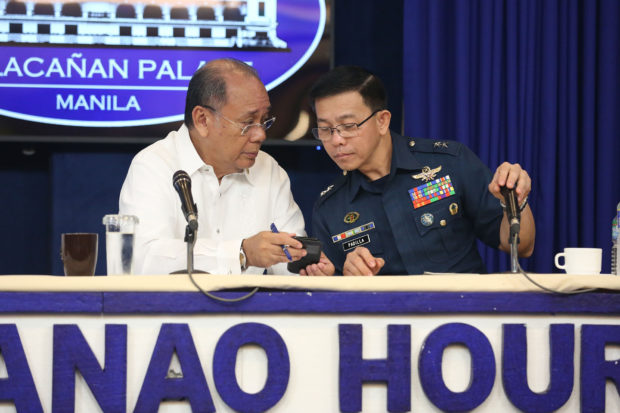
Presidential Spokesperson Ernesto Abella with AFP sokesperson Restituto Padilla during regular Mindanao Hour held at Malacañan’s Executive Building, Oct 17,2017.
INQUIRER PHOTO/JOAN BONDOC
The military on Tuesday agreed with the claim of a New York terror suspect and doctor of Maute terrorists that Philippine anti-terrorism laws are lax.
Maj. Gen. Restituto Padilla, Armed Forces of the Philippines (AFP) spokesperson, said Russell Salic, a Filipino doctor accused of planning a bombing blitz in New York City, was correct when he boasted to other terrorists that the country’s anti-terror laws are “not strict.”
“That is correct,” Padilla told reporters yesterday after a media briefing in Malacañang.
“It’s not that we are a breeding ground (for terrorists but they) have many opportunities because our laws are not that tight or not that strict so some elements are taking advantage of that,” he added.
According to the US Justice Department, Salic boasted to others involved in his plot to bomb New York City that terror laws in the Philippines were “not strict” when compared to those of Australia or the United Kingdom.
“Terrorists from all over the world usually come here as a breeding ground for terrorists…hahahaha…But no worry here in the Philippines,” Salic was quoted as telling his accomplices.
Salic, who was described by Malacañang as an “attending physician” of Maute terrorists, is now facing extradition proceedings to the United States.
Padilla said the Philippines should adopt the tough internal security laws of Malaysia and Singapore that allow for the detention of terror suspects for a long time.
“I’d like to bring the public’s attention to the other laws within our region. You may want to take a look at the laws of the internal security acts of Singapore, Malaysia, and other countries in the region who have a very robust structure for security against terrorism,” Padilla said.
“These are the things we need to adopt. That is why we have made a call to our legislators to review the Human Security Act and hopefully make it stronger so that we can guard our nation from the threats of terrorism,” he added.
Padilla said that the Philippines could copy provisions allowing longer jail time and arrests on “mere suspicion” of terror activities.
“Like in Malaysia, as far as I know, by mere suspicion you can detain them for a longer period of time—I think one week – if they pose a threat. It’s also the same in Singapore,” he said.
“They monitor activities in the Internet and if you try to go abroad, to join (terror groups), they can arrest or detain you because there is already a threat. Those are the provisions that we could study,” he added.
Padilla said Congress could insert provisions to ensure that security forces do not commit abuses or that the any security law would not be used to clamp down on legitimate political dissent.
“It has to be a balancing act. Are we really serious about protecting our national security and ensuring our cities and communities are safe? Can we trade off some liberties in exchange for that?” he said.
“These are the things that have to be considered because if the overall consideration is the safety of everyone then I think we can sacrifice a few liberties to just make sure we are able to do that,” he added.